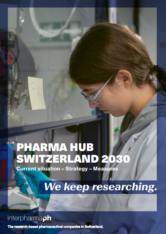20 May 2023
International Clinical Research Day: 3 questions to Prof. Miklos Pless, President SAKK
Would you please briefly introduce yourself and tell us a little bit about SAKK?
My name is Miklos Pless. I am a medical oncologist and currently the Senior Physician in Medical Oncology and Head of the Tumor Center at Cantonal Hospital Winterthur. At the same time, I have served as the President of the Swiss Group for Clinical Cancer Research (SAKK) for the past 1½ years.
SAKK is an academic and independent non-profit organization that has existed as an association since 1965. The SAKK network consists of 20 members, all university hospitals and large cantonal hospitals and covers roughly 80% of all cancer patients in Switzerland. It is the leading research network for clinical cancer research in Switzerland and the most important national point of entry for clinical cancer research with partners from the pharmaceutical industry and foreign research groups. The objective of SAKK is to improve the prognosis of all cancer patients in Switzerland through the latest evidence-based research. The SAKK competence center in Bern actively supports researchers to facilitate the development and execution of multicentric, interdisciplinary and interprofessional studies. Moreover, with its Patient Advisory Board, SAKK actively incorporates the interests of patients across the whole spectrum of its research activities, and makes a significant contribution to supporting young talents in the field of clinical cancer research through the Young Oncology Academy. SAKK has an excellent track record with regard to its study activities, with 90% of all studies started fully published in a peer-reviewed journal.
The number of clinical studies conducted in Switzerland has stagnated in recent years. What are the reasons for this? What is needed for Switzerland to become more attractive for clinical studies?
There are various reasons for the stagnation with regard to studies in Switzerland. One issue is that the prerequisites and requirements for clinical studies are ever more complex and expensive. That makes financing very difficult in a country that is already expensive in itself. It’s also a challenge in a federalist healthcare system to identify a sufficient number of patients and get them to participate in studies in a reasonable amount of time. New, innovative models are called for.
On the other hand, the number of studies at SAKK has risen steadily over the past few years and has not declined, so it’s certainly possible to address these problems. National cooperation is required here in order to keep pace with the international competition. The principle should be that the studies are brought to the patients as opposed to the patients having to come to the studies. So the ability to offer decentralized studies would be a key factor. Swissmedic has done a lot of groundwork in this regard and we will do our utmost to promote this type of studies in Switzerland.
As a research center, Switzerland lags a bit behind other locations in terms of digitization. Does this have an impact on clinical research? What would be the advantages of greater use of digital technologies in the field of research and development?
For decentralized studies and large-scale registry studies, greater digitalization is needed in order to enable patients to read, study and sign the informed consent document at home, for example. Another possible use would be to open a study center on short notice, for example, if a patient with a rare disease was identified in a certain region and wanted to take part in the study. Overall I think that although Switzerland is a small country, it has an outstanding healthcare system that is qualitatively capable of delivering very good clinical data. The quantity could be improved by having interested parties collaborate on clinical research, as the successful SAKK model demonstrates. It would also be possible to offer a single point of entry for providers of clinical studies. This would allow better and more efficient performance of much administrative work such as ethics committee submissions, writing informed consent forms and also monitoring.
 read more
read more
 read more
read more
 read more
read more
 read more
read more
 read more
read more
 read more
read more








 PDF german
PDF german Go to store
Go to store